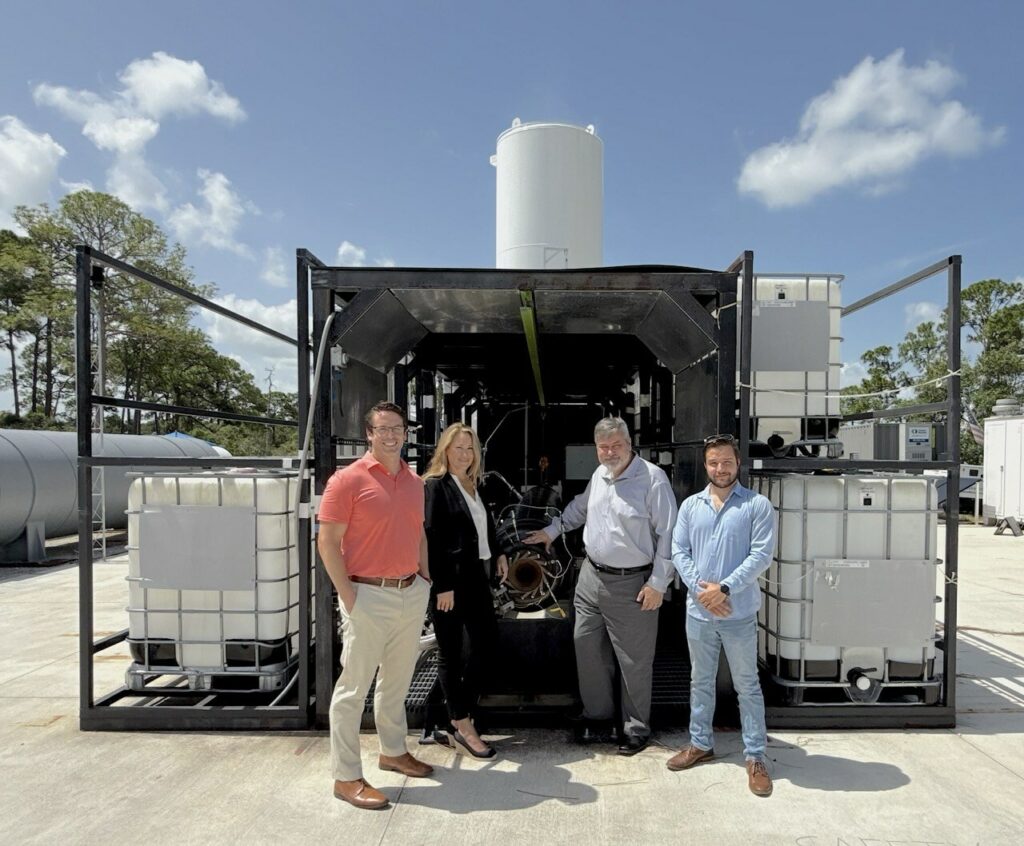
At Vaya’s Cocoa Beach, Florida, facility, Vaya Space Lead Propulsion Engineer Kineo Wallace and COO Rob Fabian share their hot fire test pad with Velo3D Vice President of Defense Brice Cooper and CRO Michelle Sidwell. Together, they reviewed the performance of Vaya’s hybrid rocket engines—engineered to be simpler, safer, and more sustainable with non-toxic, non-explosive propellants. (Photo courtesy Velo3D)
Vaya Space will leverage Velo3D’s Rapid Production Solution (RPS) to accelerate production of critical propulsion system components.
FREMONT, Calif.—Additive manufacturing technology provider Velo3D, Inc., recently announced a strategic partnership with Vaya Space, a hybrid rocket company focused on space propulsion systems, according to a release from Velo3D.
The two companies have signed a $4 million, two-year Master Services Agreement (MSA) to collaborate on production and innovation efforts in high-performance additive manufacturing (AM).
Vaya Space selected Velo3D as a key strategic partner in its propulsion development roadmap. Under the agreement, Vaya Space will leverage Velo3D’s Rapid Production Solution (RPS) to accelerate production of critical propulsion system components and meet key development timelines.
Using Velo3D’s Sapphire XC and XC1MZ printers, Vaya Space will print parts in both GRCop42—a NASA-developed copper alloy for high-heat transfer—and Inconel 718, a superalloy known for strength and thermal resilience in aerospace applications. Vaya currently uses the Sapphire platform to produce the world’s first expander cycle hybrid rocket engine, the release stated.
As part of the partnership, Velo3D will serve as Vaya Space’s exclusive provider of GRCop42 additive components, delivering guaranteed capacity, advanced engineering support, and Flow™ software training to streamline design-to-production cycles for propulsion assemblies through 2027. The assemblies are reported to include nozzles, injectors, and turbopumps.
The two companies will work collaboratively to produce high-quality engine components for aerospace and defense applications faster and at a lower cost than traditionally achievable.
“This partnership is a powerful example of how our Rapid Production Solution helps scale complex hardware manufacturing for today’s most ambitious aerospace companies,” said Velo3D CEO Arun Jeldi, Ph.D., in the release. “By combining our capabilities in GRCop42 and Inconel 718 with deep engineering collaboration, we’re helping Vaya Space achieve faster, more cost-effective production—right here in the United States.”
“Additive manufacturing plays a central role in our ability to reduce design complexity, increase performance, and scale production,” said Vaya Space Vice President of Operations Aaron Blankenship, in the release. “Velo3D offers the production readiness, material capabilities, and deep technical partnership we need to bring our vision to life and deliver flight-ready engines on schedule.”
The MSA includes a joint marketing roadmap and formal signing event at Vaya Space’s testing facility in Cocoa, Florida, where one of the propulsion systems produced with Velo3D parts will be on display.
Velo3D is a metal 3D printing technology company. 3D printing—also known as additive manufacturing—has a unique ability to improve the way high-value metal parts are built. However, legacy metal AM has been greatly limited in its capabilities since its invention almost 30 years ago. This has prevented the technology from being used to create the most valuable and impactful parts, restricting its use to specific niches where the limitations were acceptable, the release stated.
According to Velo3D, it has overcome these limitations so engineers can design and print the parts they want. The company’s solution is said to unlock a wide breadth of design freedom and enables customers in the space exploration, aviation, power generation, energy, and semiconductor industries to “innovate the future in their respective industries.” Using Velo3D, these customers can now build mission-critical metal parts that were previously impossible to manufacture, the company said in the release.
